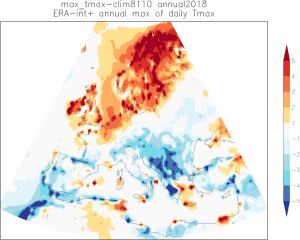
A map shows the hottest three-day average of maximum temperatures in 2018 compared to the highest three-day maximum temperatures in the period 1981-2010 that is currently the “normal” period.
The unprecedented temperatures seen over summer 2018 are a sign of things to come—and a direct result of climate change, according to new Oxford University research.
In a newly published report, researchers from the Environmental Change Institute (ECI) at the School of Geography and Environment, Oxford University, who worked in collaboration with the World Weather Attribution network (WWA), reveal that climate change more than doubled the likelihood of the European heatwave, which could come to be known as regular summer temperatures.
According to Dr. Friederike Otto, Deputy Director of the ECI at the University of Oxford, “What was once regarded as unusually warm weather will become commonplace—in some cases, it already has.”
The research compares current temperatures with historical records at seven weather stations in northern Europe: two in Finland; one each in Denmark, the Irish Republic, the Netherlands, Norway and Sweden. These stations were selected because current temperature data could be accessed in real time, and they possess digitized records extending back to the early 1900s. The scientists also used computer models to assess the impact of man-made climate change.
For each year in the historical record, the team looked at the hottest consecutive three-day period. For 2018, it was the hottest three days of the year so far—either observed or in the short-term forecast.
The findings show that the planet is definitely heating up, and for some of the weather stations, current temperatures are unprecedented in the historical record.
“We found that for the weather station in the far north, in the Arctic Circle, the current heat wave is just extraordinary—unprecedented in the historical record,” said Dr. Geert Jan van Oldenborgh, senior researcher at the Royal Netherlands Meteorological Institute.
The WWA team plans to publish these results formally in a scientific journal. This will form part of a more in-depth analysis of this extraordinary summer; the team will also assess whether climate change played a role in the prolonged high pressure seen in northern Europe since May.
